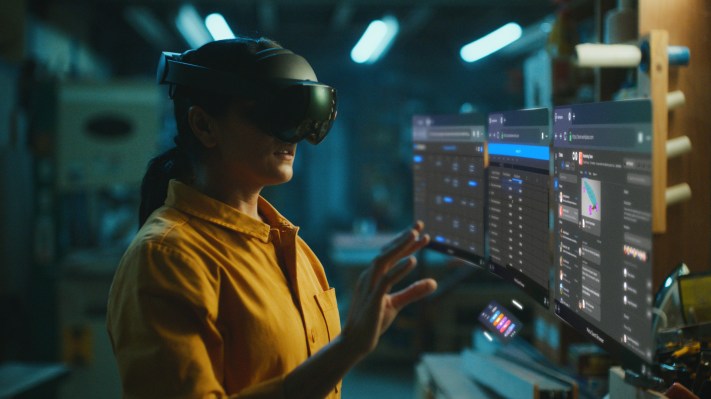Earlier this year, when we covered the news that Meta had signed on with fast food giant McDonald’s as a customer for Workplace, the B2B service that was originally conceived as a Facebook for enterprises, we noted that Workplace the product had, curiously, been moved into a larger “Reality Labs” division to bring it closer to Meta’s VR business. Today Meta is announcing some new developments that speak to this pivot: a raft of enterprise services aimed at a new effort to get businesses using its new, high-spec $1,499 Meta Quest Pro VR headsets in the workplace.
They include a new version of the company’s Horizon Workrooms, and partnerships with Microsoft, Accenture, Adobe and Autodesk to build out more enterprise-ready and designer-ready VR services.
The turn is not out of the blue: It’s well-known that businesses are likely to be some of the most likely (and if you’re skeptical maybe some of the only) long-term customers of VR technology. Meta itself had already been taking some steps to building applications and experiences for them. (Albeit, it’s definitely not followed through on all of them. Oculus for Business was sunset with the replacement, Quest for Business, today still only in a closed beta. “We learned a lot from that,” was the main takeaway according to Micah Collins, director of Product Management for Meta’s work products when I spoke to him yesterday.) In the meantime, while Facebook’s hardware has had good reviews, it’s never knocked it out of the park with its consumer content for it. (The $1.5 billion spent to date on Quest games and apps that Meta announced today is however a bright spot in that consumer story.)
At the same time, Facebook’s other big enterprise effort, Workplace, has somewhat stagnated in terms of native product development in recent years (a big integration with Microsoft’s Teams signaled a focus on partners instead). So building more enterprise services for its device is the next logical step for Meta as it gets it new device into the world and looks for customers to buy and use it.
The cornerstone of that strategy is the device itself. Meta highlights how features like high-contrast pancake optics and full-color mixed reality have direct applications in the workplace respectively for working in documents and collaborating on VR screens while still being able to interact in a physical room. Much has been mocked about the graphics previews that Meta showed off earlier this year, but for what it’s worth, the company says that facial recognition and eye-tracking have been improved to help create more realistic avatars — not something that I imagine is the top priority for businesses but probably nice to have.
More to the point, though, Meta’s unveiling a more enhanced Meta Horizon Workroom for collaborating with others in VR. These include the addition of breakout groups, “sticky notes” for whiteboards, multiple screens, Zoom integration, 3D modeling and “Magic Rooms,” which let teams create rooms in VR of people from both remote and in-person environments. A multitude of startups are building different permutations of these features for enterprise mixed-reality applications — Gravity Sketch is one of many we’ve covered — but this is notable for all being in one single platform. Focusing on Horizon Workrooms is a smart move and an example of building on strengths: The first version, when it was launched in August 2021, was described by Lucas (quite aptly) as Meta finally making a good app for VR.
Meta’s ever-closer relationship with Microsoft is an interesting complement to this. Satya Nadella, Microsoft’s CEO, took to the stage in today’s presentation with Mark Zuckerberg to talk about their bigger collaboration around VR and services for enterprises. This will include bringing Teams and Windows 365 to the Quest Pro, bringing Quest Pro avatars into Teams, and critically, it will also see integration of some of the other aspects of Microsoft’s services, such as enterprise security and device management, brought into Meta’s Quest Pro environment, an important aspect of getting more enterprises on board.
On that front, this is also where Meta’s next big partnership will also figure strongly: The company is going to be working closer with Accenture as a bridge between Meta and enterprises, which rely on consultants and integrators to get tech embedded and operational. That has started with Accenture itself, which has disseminated 60,000 Quest 2 headsets to its own employees. It’s numbers like this that are probably music to Meta’s ears (and in the case of VR, eyes too).
